|
This is a tough topic to address although they're all tough to a certain degree. I haven't always been successful myself with this delicate dance of grandparenting. As an older adult who has made lots of mistakes and hopefully learned from most of them, I have a lot of advice to give. However, it's not always welcome, and I haven't always recognized that. Parenting is the toughest job there is and often doesn't get its due from non-parents. Grandparenting is supposed to be the easiest and most wonderful follow-up to that, and it usually is. However, it is very hard to watch your adult children make mistakes, especially when they could have been avoided. My rule for myself now is to either wait until asked or ask first if they'd like to know what I think. If they say no, I respect that but might try again later depending on how important I think it is. New parents often feel defensive about their parenting skills. I know I did. We don't know what we're doing and worry that we'll do it all wrong. However, we also need to feel in charge and make our own mistakes. So, how do we find that balance? Elders are an important source of information. We don't have all the answers but we probably have a lot. As for me, I nursed three of my own babies, had hospital births and homebirths, sent my children to public school, private alternative school and homeschooled them. I dealt with food allergies and too many illnesses to name here, including accidents that needed stitches. I learned how to do my own butterflies on wounds when we had no health insurance and studied herbology and natural healing. I made my own babyfood and dealt with sleep issues, discipline and more. My children were all different with their own set of issues, so I've had to learn a lot over the years. When my children were teens and adults, I faced more issues than most people ever have to deal with and know how to navigate multiple "systems." Basically and unfortunately, I am a font of knowledge. That is what the role of elders is supposed to be. We are fonts of knowledge. If one elder doesn't know the answer, another one will, and most of us want to help out. We want to be asked. In previous generations, elders lived with or close by their children giving assistance and guidance. Often the elders raised the kids. Most of us are really good at it and have much more patience. We see things differently as we age. That different perspective is very valuable and, let's face it, we want to feel valued as we age. We're not ready to be thrown out and discounted. Many of us are in the prime of our lives. So let's move on to the parents. As a parent, the last thing we want is to be told we're doing something wrong. We're doing the best we can and are obviously bound to make mistakes. Who wants that shoved in their face? Grandparents need to let parents make those mistakes so that they learn. When they do make those mistakes, it's important that we not say, "I told you so," or "If you'd only listened to me..." What grandparents need to do then is listen and comfort their hurting child. It's not easy to face our mistakes but an important part of the process. If we want our children to come to us in times of stress or times of need, we need to be compassionate and loving even if we would have done things differently. The more supportive we are instead of being critical, the more likely they will come seeking advice when they need it. However, parents do need to remember to ask for help, too. Ultimately, there is no magic answer to any of this. Like I said, parenting is the hardest job, and it doesn't get easier when your children have children of their own. But the best course, in my opinion, is for grandparents to hold their tongue and for parents to seek out their parents' learned knowledge. Although my own mother and I didn't get along well, I often turned to her for parenting advice. We can all work together as a team. It really does take a village to raise a child.
0 Comments
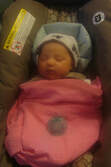 Everyone who has had a baby knows that sleep is a huge issue. How do we get our babies to get enough sleep, to fall asleep on their own, to not get woken up easily? These are just a few questions that parents have to face with their very young ones. Some folks do a “family bed,” though many experts warn against this. Some people do “sleep training.” Some babies just fall into a routine without much effort on the part of parents. In my opinion, there are no right or wrong ways to help your baby with this issue. It is up to you to decide what works best for you. However, I can share what I did with my own babies. Not every child has the same sleep needs. Some babies will take morning and afternoon naps. Some of them will take only one nap a day and some will take several short catnaps more often. My daughter rarely took naps and had trouble falling asleep at night. Once she fell asleep, she slept well. My first son still took afternoon naps until he was 7 or 8, coming home from school most days and falling asleep on the couch. It’s important that we pay attention to what their sleep needs are and help facilitate their sleep. I believe that we should let them lead us in what they need, within reason of course. I always sang to them before putting them down for bed, whether it was a nap or their regular bedtime. I did this until they were old enough not to be tucked in. When they were little, I rocked them and nursed them before bed, singing while we rocked. As tiny infants, I usually held them until they fell asleep then laid them in their beds. At first, they didn’t want to stay in their beds but wanted to continue being held. I gently patted them, singing while I did until they settled and slept. When my children were little, we put them down on their stomachs. Now, the recommendation is to lay them on their backs, but you can still pat their tummies or chest. Once I thought they were asleep, I stopped patting but continued to sing for a few more minutes getting quieter until I was no longer making a sound. I didn’t like the routine of letting them cry themselves to sleep. I understood the concept of babies learning to self-sooth and agreed with it but chose to go about it in a gentler way. Sometimes, they would fall asleep in the car. In that case, I would carry their car seat inside and let them finish their nap there. If it was a very bright day, I'd throw a light blanket over it to block out the light or put it in a darkened room. I decided not to have a “family bed,” though I have nothing against them, because my husband was such a sound and active sleeper. The other downside for me of a family bed was that I didn’t sleep well enough. I needed to have a good night’s sleep without worrying about the tiny child next to me. We had a partial family bed in that I brought my children into my bed to nurse and snuggle, and they were always welcome in the early morning when I would just doze. My infants were in the same room with us and right next to the bed, so I could reach out and touch them at any time. After all I thought, who ever wants to sleep alone given the choice? After being in the womb, surrounded by warmth and the smell and sound of their mother, it must be very alien, and maybe frightening, to suddenly be all alone. However, I had to deal with practicalities. When they were infants, I wore my babies in packs during the days and sometimes slept with my babies for their naps but found I couldn’t leave them to catch up on chores for fear that they would fall out of the bed, so I often moved them into their own beds once they were asleep or slept on a mat on the floor with them so that I could sneak out without worry. I had just turned 22 when my daughter was born. Her dad and I were musicians, practicing and jamming sometimes late into the night. I knew I needed her to stay asleep in spite of the loud sounds around, so I made lots of noise. I always recommend this to parents who don’t want to have to tiptoe around their babies. I vacuumed in her room while she was sleeping. I dropped heavy things and spoke or sang loudly right next to her as she slept. She learned to block out those sounds and once asleep, slept soundly. I did the same with each of her brothers and with my grandchildren. They could sleep through anything, so I had to train them to wake for certain sounds like smoke alarms. Babies are incredibly resilient. They learn quickly and definitely learn how to manipulate adults when they are very young. Most people don’t give babies enough credit for being as smart as they are. They are like little sponges, learning new things every day, even every hour. But they are also strong and know what they want. The tricky thing is learning to stand your ground without squashing their spirit. Every parent knows instinctively what to do. Follow your heart but be aware that parenting is hard work that requires us to do things in the best interest of our child, and some of those things may not seem as though they are in their best interest at the time when they are crying. And honestly, wouldn’t it be nice if we could all get everything we wanted by just crying? This might be one of the hardest things for me to have learned as a parent. While I was growing up, my parents had very unreasonable expectations for me and my brother - ones that we could never live up to, though I tried hard my whole life and always, until fairly recently, ended up feeling like a failure. That’s what happens when we set the bar too high for our kids. We certainly don’t intend to do that, but our kids want to please us, to make us proud, so they try their hardest to achieve that goal. The flip side of that is not setting the bar high enough. It’s a very tricky balance and one I’ve struggled with as a parent.
Just like with limit setting, we have to constantly assess each situation and be flexible. For me and my brother, we had different abilities and different interests. It would have been unreasonable for my parents to expect my brother to be a great musician or for me to be a great athlete. We each had our own likes and dislikes. I loved music, art and writing. He liked sports. I’m sure some of that was a sign of the times in which we grew up, but probably not all of it. I knew from very early on that I was a musician and hoped to spend my life doing that. I wasn’t encouraged to pursue other interests and wasn’t discouraged from pursuing what I loved, but I was never able to please my parents with what I saw as my own successes. That continued on into my adulthood. They never asked about my music and never came to gigs because it wasn’t the music they liked or wanted me to be playing. It wasn’t until they passed that I heard from their friends and acquaintances, at their respective funerals, that my parents were very proud of me and bragged often, playing tapes and CDs of my music to whoever would listen. Although it was wonderful to hear that they really were proud, it made me very sad that I never knew while they were still alive. Please tell your children about the things you love that they do but be genuine. You are obviously not going to like everything. Just don’t criticize what you don’t like and praise what you do. If they ask you, be honest with them. You can say things like, “I’m not really that fond of …, but you do it well.” Or, “I don’t know much about it, but I’m sure it’s great.” I have given that answer to my children on occasion. We want them to be realistic without discouraging them. I’ve often said, “That was great. I wonder if you could improve it by …” Or, “Have you tried …? That might make it even better.” We all need productive criticism sometimes. Suggestions for improving things are helpful and, if said the right way, they don’t have to be discouraging. I think the most important thing to remember is that we want to be interested in the things our children are doing, regardless of how we feel about them, but we want to retain our critical eye, too. They depend on our input. Sometimes we are afraid to tell the truth for fear of hurting them. It’s all in the way we approach it. In my song circle, I always encourage people to express the things they like before launching into their critique. Remember, honesty is the best policy, but always approach it gently. I'm writing this a little late, but life gets complicated sometimes, and I have to just go with the flow. We've just entered 2019 and started a new year, whatever that really means. Our young children can't possibly understand the passing of time fully. They just know that everyone says things like, "See you next year," or "Happy New Year!" It's like birthdays. Who ever feels older on their birthday, except conceptually? Time keeping has always baffled me. A friend was once given a watch with "NOW" written instead of each number. Now that's my kind of watch. However, I do the idea of starting anew with plans and schemes for how I would like my life to go in the coming year.
I've always been a fan of tradition. On Thanksgiving, much to my family's chagrin, I always ask what everyone is thankful for and insist that everyone answer. This Winter Solstice, I asked everyone to share a story. Not everyone did, and I didn't insist since it was a new thing, but they'd better be prepared next year. As much as they all complain, they also enjoy it. On New Year's Eve, we celebrate at midnight, but not every child will stay up that late. Why not have your celebration early. Celebrate the new year of a different time zone. Who will really know the difference? You could even find out what the traditions are for that time zone. I like to think about the things I'm leaving behind from the ending year on New Year's Eve. I think about the difficult things and try to let them go. I believe it's a good way to acknowlege hard times with your children without dwelling on them and giving them permission to move on to happier things. On New Year's Day, I like to plan to do all of the things I want to do in the coming year. This year, I did a little cleaning (because I really don't want to spend my whole year doing that but do want a clean space), practiced my music, wrote a new song, cooked a nice meal, spent time with my partner and went for a walk, visiting our lovely neighbors along the way. I also reached out to my family members in some way or other. It's not too late to do that with your children. Why does it have to be on January 1st? It can happen anytime in the beginning of January. Just encourage them to think about how they would their year to go and ask them to intentionally do those things at this beginning of the year. Because I love tradition so much, I researched New Year traditions from around the world. Noise making was done in many cultures to drive away evil spirits. Many cultures have special foods that they eat on New Year's Eve and New Year's Day. I made Scotch Shortbread this year to honor the people who were more like grandparents to me as a child than my own because they lived so closeby. Drinking is a common theme, and most of the drinks are spiced and warm. In Rome, Persia, early Egypt and in Scotland, gifts are given on New Year's Day. Some adages and sayings associated with the New Year are: * On New Year’s Eve, kiss the person you hope to keep kissing. * If New Year’s Eve night wind blow south, It betokeneth warmth and growth. * For abundance in the new year, fill your pockets and cupboards today. * If the old year goes out like a lion, the new year will come in like a lamb. * Begin the new year square with every man. [i.e., pay your debts!] –Robert B. Thomas, founder of The Old Farmer’s Almanac Notice that a lot of these saying are about starting the year off on the right foot. The Scottish have a tradition called "First Footing." Have you thought about any behavior changes you would like your children to make? This is perfect time to talk about those things while letting them know about the changes you plan to make as well. And, do they have any request of you? We can all build our own traditions from scratch or based on older traditions. They don't have to be from our own culture, but I think acknowledging our heritage and keeping those traditions alive is always a good thing. Whatever you decide to do, be sure to include your family in the planning. Then everyone feels as though they can own it. My traditions nearly always involve music of some kind because that's more important to me than specific food or drink. Some cultures leave a basket of things outside on New Year's Eve and bring it in on New Year's Day. The basket is filled with things you want to have during the year. What would you put in your basket? I hope 2019 brings lots of happiness, health and laughter to all of you and your families. 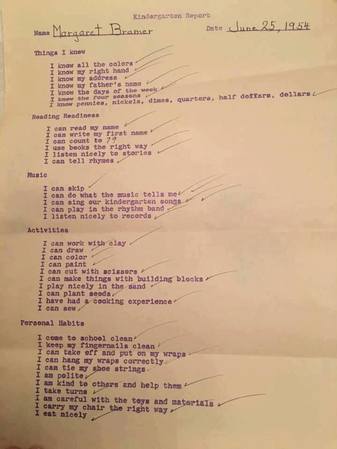 Today, I saw a post on Facebook of a 1954 Kindergarten report card. The grades were for participation and socialization in class (for instance, listens nicely to stories, plays nicely with others, being polite and kind), and physical skills such as cutting with scissors, writing your first name, is able to skip and tying shoes. I went to Kindergarten in 1958. I remember walking to school with my mother and spending most of the day playing, or what I thought was play. In reality, all of the play we did were learning experiences. We painted, learning the proper way to hold the brush and learning colors at the same time. We learned how to throw and catch a ball, how to hop and skip and how to balance. We learned cooperation through the games we played. We built with blocks and used modeling clay, learning spatial relationships. Everything we did in Kindergarten was a learning experience but to us, it was playing. Because there was not as much focus on academics at that age, we learned how to behave well. We were taught manners and other social skills. We also learned our letters and numbers, learned to tell time and learned our days of the week and months of the year. We memorized our address and phone numbers. Through no fault of their own, teachers today are so focused on teaching children to read and write and do math at such an early age, those social skills are often getting lost in the shuffle. In a perfect world, children would be learning those things at home. However, that isn’t always the case. I know of some families in which children don’t play outside every day. They don’t have their parents playing outside with them, teaching them important lessons. They don’t explore their neighborhoods as I did. There are not gangs of kids outside playing ball or tag or other social games. This is a great loss for our society. In any given day, how many children are sitting by themselves after school reading, playing video games or watching television? They are lucky if they have siblings so that they’re not totally isolated from their peers, but not every child has a sibling, and not every parent sets up regular playdates for them. Let’s look at just one academic skill … reading. It used to be that kids learned their letters in Kindergarten. In first grade they moved on to simple reading and most of them progressed very quickly from there. However, some kids are not ready until much later. Those children who are not developmentally ready experience extreme stress that often carries on into later grades. Some children are ready to read at an earlier age. My daughter taught herself to read at age 4. She was always read to from the time she was an infant and had started to recognize letters and then words. I never actively taught her. She was just ready. One of her brothers also learned to read before starting school. Their other brother did not and resisted learning until he was around age 9 or 10. When I worked in alternative education, I had a student whose parents were both very well-read lawyers. She refused to learn to read until she was 11 and then read voraciously. She did not fall behind because she started late. Children who are behind the others in reading or other skills, feel like failures. They can’t keep up in class and often carry that sense of failure with them into higher grades. They also often stop trying. But the real loss here is the lack of play-based, experiential learning that is so important at young ages. Through play, children learn to experiment and discover on their own which aids in their further learning. Finland’s education system is among the best in the world. They have figured out how important play is for learning. Our kids need to foster independence. They need to learn independent learning as well as learning how to navigate a complex world. They need to find out what questions they want answered. In our current educational system, everything is so regimented, they never have a chance to think for themselves. They have a ridiculously short amount of time for recess, which is one of the most important parts of a school experience. This is where they make lasting friends, learn to treat each other well, learn sharing and cooperation and so much more. Young children are not wired to sit still in a classroom for hours at a time. They need to move their bodies. Even the NEA is reexamining the current academic standards for Kindergarteners. One of the other things that I think is very wrong with our current educational system is the amount of homework given, even in Kindergarten. Instead of encouraging our children to be kids for as long as they can, which is such a relatively short time, we are teaching them to be automatons that can reguritate facts and pass useless tests. Then, we complain that kids are growing up too fast. Is it any wonder? We are taking their childhoods away from them, in some cases as early as preschool. Here is an example of an eighth grade test given in Omaha Nebraska in the 1800's where the school year was much shorter and resources for education were very slight. All of the students were in the same room with one teacher who was responsible for all of the grade levels. There was no homework given, and the school year was 134 days long. Grammar (Time, 1 hour) 1. Give the nine rules for the use of Capital Letters. 2. Name the parts of speech and define those that have no modifications. 3. Define: Verse, Stanza and Paragraph. 4. What are the principal parts of a verb? Give the Principal Parts of do, lie, lay, and run. 5. Define Case. Illustrate each case. 6. What is Punctuation? Give rules for principal marks of punctuation. 7-10. Write a composition of about 150 words and show there in that you understand the practical use of the rules of grammar. ARITHMETIC (Time, 1 1/2 hours) 1. Name and define the Fundamental Rules of Arithmetic. 2. A wagon box is 2 ft. deep, 10 feet long, and 3 ft. wide. How many bushels of wheat will it hold? 3. If a load of wheat weighs 3,942 pounds, what is it worth at 50 cts. per bu., deducting 1050 lbs. for tare? 4. District No. 33 has a valuation of $35,000. What is the necessary levy to carry on a school seven months at $50 per month, and have $104 for incidentals? 5. Find cost of 6,720 lbs. coal at $6.00 per ton. 6. Find the interest of $512.60 for 8 months and 18 days at 7 per cent. 7. What is the cost of 40 boards 12 inches wide and 16 ft. long at $20 per in.? 8. Find bank discount on $300 for 90 days (no grace) at 10 per cent. 9. What is the cost of a square farm at $15 per acre, the distance around which is 640 rods? 10. Write a Bank Check, a Promissory Note, and a Receipt. U.S. HISTORY (Time, 45 minutes) 1. Give the epochs into which U.S. History is divided. 2. Give an account of the discovery of America by Columbus. 3. Relate the causes and results of the Revolutionary War. 4. Show the territorial growth of the United States. 5. Tell what you can of the history of Kansas. 6. Describe three of the most prominent battles of the Rebellion ORTHOGRAPHY (Time, 1 1/2 hours) 1. What is meant by the following: Alphabet, Phonetic, Orthography, Etymology, Syllabication? 2. What are elementary sounds? How classified? 3. What are the following, and give examples of each: Trigraph, Subvocals, Diphthong, Cognate, Linguals? 4. Give two uses of silent letters in spelling. Illustrate each. 5. Define the following prefixes and use in connection with a word: Bi, Dis, Mis, Pre, Semi, Post, Non, Inter, Mono, Super 6. Mark diacritically and divided into syllables the following, and name the sign that indicates the sound: Card, ball mercy, sir, odd, cell, rise, blood, fare, last. 7. Use the following correctly in sentences: Cite, site, sight, fane, fain, feign, vane, vein, raze, raise, rays. Write 10 words frequently mispronounced and indicate pronunciation by use of diacritical marks and by syllabication. I find this very interesting. Given that we have a much longer school year, shorter recess, more homework and very high expectations, it seems to me that we should much further ahead if our new standards are working. I encourage you to talk to some teachers about how they feel about their jobs in today's schools. Unfortunately, they are not able to teach. Rather, they drill preset lessons into the heads of mostly reluctant children so they can pass tests. ANd, how much practical learning are they getting? In Omaha, a farming community, their math lessons are based on what they need to know. And obviously, those who wanted more could get it. There were no limits placed on them. Here are a few articles for continued reading: www.melbournechildpsychology.com.au/blog/play-experiential-learning-early-childhood/ https://www.todaysparent.com/family/activities/right-age-to-read/ https://www.washingtonpost.com/news/answer-sheet/wp/2015/01/13/report-requiring-kindergartners-to-read-as-common-core-does-may-harm-some/?noredirect=on&utm_term=.e61e60d95557 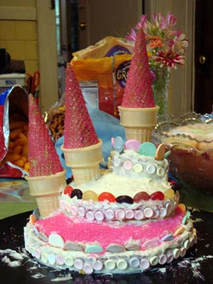 This cake was made by my daughter for a princess party. It was not the time for me to fight the growing princess obsession, which I hated. And, what a great cake! This cake was made by my daughter for a princess party. It was not the time for me to fight the growing princess obsession, which I hated. And, what a great cake! Okay, I know it's the holiday season, but my mind goes to birthdays because my granddaughter's birthday is Christmas Day. While I was raising her, we celebrated her birthday first thing in the morning with a fruited coffee cake or a shortcake for breakfast, complete with candles and singing. We weren't celebrating Christmas at that time and had already done our Solstice celbration, so it was just her birthday ... until we went to visit other relatives who did have Christmas. Most of her friends couldn't or wouldn't come to a party during the holiday break, so I started giving her a half-birthday party in the summer. For children with winter birthday near the holidays, this is a great option. They are usually a little overwhelmed with gifts or sometimes feel cheated. Even my son, whose birthday is in early February, often felt a little cheated around his birthday. Everyone is burnt out from the holidays, and the stores are often sold out of the "cooler" gifts, having cleared their shelves for inventory. He loved his summer party! In the summer, you can do your party outdoors, even at a beach or park. That's often a better option than cramming a dozen or more kids, especiually high-strung active boys, into your house. It's also easier to keep them occupied - they will actually occupy themselves easily. When you're indoors, you have to come up with a plan. I remember deciding to do a piñata for one of my son's birthday parties, not taking into consideration that I would have a crowd of stir-crazy kids. I thought they were going to wreck my house swinging that pole around. Luckily it had a happy ending with my stereo intact, but you get the idea. For a few years, I worked as a party planner for kids parties. It was a lot of fun. I met with them and asked for a theme then created activities around that theme. The cake was up to the parents, but everything else was mine to determine. One girl wanted a beading party, so each of her guest made an item of jewelry to take home. Another girl wanted a circus theme. The decorations were easy, and we did face painting, I set up a balance beam for a tightwire walk and had other fun circus related activities. I've done dinosaurs, fairies, outer space and more. I'd had a lot of experience with my own kids who always challenged my creativity, so I was ready for that job. If you don't have a party planner, the job can seem overwhelming, but it doesn't have to be. Try to keep it simple. Choose a few simple games, keeping in mind the ages and temperments of the kids attending. An indoor piñata might not be the best choice for a group of rowdy kids (lol). Choose at least one quiet sit-down game too, to reengage the focus after an energetic activity. Some simple ideas are having them color their own solid color paper placemat before sitting down to eat, or having a bowl of jokes for them to pick and read aloud. Depending on the age and number of party-goers, a new and fun board game could be an option. Madlibs are always a hit, and they have a variety of themes. With the very young, music and art are good options. They may not stay entertained for long, but they will be drawn in for a little while. Toddlers can do playdough or fingerpaint with pudding on a large plastic mat on the floor or at a table. A shower curtain works great for this and can be picked up at a Dollar Store. I used to just hose it off and save it for the next time. So what do you do about your space? I always suggest putting away any toys that your child feels protective of, no matter what age they are. You can't always reason with them, and a birthday party is not the time to teach that lesson. You can make it easier on everyone by thinking ahead and removing potential threats. Also, remember that not every child attending knows your house and your rules. Once again, think ahead and childproof your house for a party. Do you have pets? Some children may be frightened or may be too rough. Think ahead and have a safe place for your pet. Also, if you have an entertainer come to your house, set them up in a room cleared of distractions. As a performer who works birthday parties, I know there's nothing harder than trying engage a group of kids where there are toys available. Do your performer a favor and leave the toys for before and after the show. Now, what do you do if your child has been invited to someone's party? Always ask if you are expected or encouraged to attend with your child. This may not be applicable to older kids, but the host might actually appreciate your help, especially if they are already your friend. If they're not, what better way to get to know them than offering to help out. Don't be offended if they refuse. They may already have the help they need, and you might be in the way. If you are asked to stay, be helpful but not invasive. Your child is someone lese's home with their set of rules. You are there to help, not to interfere. Be sure to talk to your child ahead of time about your expectations for their behavior, though most kids are better behaved when we're not around them. Do they have food allergies or other food restrictions? If so, be sure to let the host know well ahead of time. They are already doing an enormous amount of planning. It's not fair to spring that on them and not fair to put your child in a position of having to refuse something. It makes them stand out - not necessarily what they want. My daughter was not allowed sugar when she was young. We just didn't have it in the house, and neither did our friends at the time. When she started kindergarten, she was invited to a friend's house for a playdate. She came home in tears because she was offered kool-aid and cookies and thought she had to refuse because of the sugar restriction. It never occured to me that she would not accept it when offered by someone else. I quickly assured her that the rules were for our household, and when she was at a friend's house, she could choose for herself. If she'd had an allergy, that would be different, but it was just a decision I had made as a parent. I decided that it was okay for her to eat differently once in a while. I think that two of the most important qualities of good parenting are flexibility and creativity. We want our children to learn to make rational decisions, but we also want them to grow to be productive kind and thoughtful adults. We need to know when to stand our ground and when to back off and let them blunder. We need to think quick on our feet and be willing to compromise. Birthday parties are no exception to this, whether we are throwing the party or attending. They are supposed to be fun for everyone, including the parents, so enjoy yourself! I am always looking for blog post ideas. It can be a little overwhelming to come up with weekly topics, and I always appreciate your suggestions. Please keep them coming. Teaching gratitude was one that came up, but I wasn't sure how to approach this one and have thought about it for months. I realized that it is an important thing to be thinking about at this time of year when many of us are receiving and giving gifts. I give gifts with no expectations but I also know that's not true for everyone. And, who doesn't want to be appreciated for what they've done whether it's giving a gift or showing kindness in some way?
Of course, we want our children to show gratitude for things that they're given or things people have done for them. In past generations, thank-you notes were a staple. Now, I can't think of very many people who send them, though there are a few. In my classes, parents often remind their children to thank me when I had out instruments or props, while others just thank me themselves. Some don't even do that, which is fine, maybe they're distracted or just not thinking about it. I have never looked at it as a requirement. Occasionally, I get thank-you cards from my families, which is always very sweet. I'd like to believe that children who are encouraged at a very young age, will get it, but I know that might be a little naive. The best way to teach anything is by modeling the behavior we want to encourage. Some children pick up on manners easily just by observing, while others don't. My grandson was not one of those who picked it up easily, though he certainly was taught well. I remember one Christmas Day at my parents' house when he was given a gift that we all knew he had asked for. My mother had checked beforehand to be sure that she got something he would love because he often made disparaging remarks about gifts given to him, or just rudely tossed them aside. We had no idea that someone else had already gifted him this lego set that he now opened. When he saw it, he rolled his eyes and said in a very snotty tone, "Oh great, I already have this!" Then he tossed it aside. His mother and I got up simultaneously, she reached him first and hauled him outside. You can guess the rest of the story except that, he was a very stubborn child and never made amends. He had consequences, limits and more consequences throughout his childhood and was just his own person. Nothing anyone did seemed to make any difference. Now, he is a wonderful adult, thoughtful and kind, and he expresses gratitude. But as a child ... So the short answer is, I don't really know how to teach gratitude. I think the best we can do is encourage it along with other behaviors and start nice and early so that it's second nature. I know that it doesn't work to punish or push too hard. I think sometimes we just have to hope for the best. I also know that eventually children grow up and find their own way. Hopefully, like with my grandson, the lessons stick. We all have our own traditions. Some of them have been passed down from our families, and some of us create our own traditions to be passed down or not. I celebrate the Winter Solstice. I’ve written many times about my decision to stop celebrating Christmas and of the creation of my holiday tradition. I won’t repeat it here, but you can listen to the spoken word memoir piece about it here. I wouldn’t play the memoir for your kids as there are a couple of possible spoilers, but you can certainly share the song below that goes along with the memoir. Tomorrow is December 1st, so tomorrow night I’ll light one candle, adding one each night until we reach December 22nd. I love this tradition, but I have to admit that I’m a sucker for Christmas music. Yes, I have the station saved on my car radio and when alone, I crank it up. Any holiday that includes music is good with me, but not everyone wants to hear Christmas music. Fortunately, there are plenty of winter songs you can share with your kids. “Frosty the Snowman,” Jingle Bells” and Winter Wonderland are just a few. The important thing is, remember to sing! Singing is a wonderful way to reduce the stress of the season, and we all feel it to some degree. I know that I’ve noticed the traffic getting crazier as so many people are rushing around getting their shopping done. I’m sometimes stressed because I’m feeling bombarded by the commercialization of Christmas. Kids often feel left out, if their families don’t celebrate that holiday because it’s become such a huge part of our culture. All of those stresses can be alleviated, at least to some degree, by singing together.
So … I am also a sucker for Christmas lights. I know it’s wasteful, especially those outrageous displays, but they’re fun, and they’re a welcome break from all the gloom of the darkening days. I used to play the “Christmas Light Game” with my kids. It was a fun competition to see who could point out the most light displays. It kept them occupied and interested on long car rides. They could do it endlessly because the landscape constantly changed adding new sights. When they got older, we turned it into a cooperative game because the competition was getting stressful. It was still fun, and once in a while, they would revert back to the competitive game. When I chose to give up Christmas, I could have been a Scrooge about it invading my life but decided instead to remember that I can be flexible and embrace the parts of it that I like. There are always going to be things I’m not fond of, but I don’t have to put a lot of energy into hating them. I can tweak them a bit, create something to take their place or just ignore them, but music and fun will always be a part of whatever I do and for me, that includes Christmas Carols and lights. I hope you'll share your traditions with me. I'd love to hear about them. 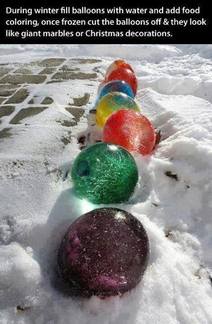 What can I say? I love playing in the snow, though I didn't get outside long enough to play today. I'll take a walk later, maybe down the steep hill to get my mail. I miss having children around to play with. It's just not as much fun making snow sculptures by myself. However, I try to remind myself how important it is to go outside when it's cold out. Children, in particular, need lots of time outdoors. Most of them don't get the same amount of outdoor play as I did when I was a kid. Most of them don't get as much play time at all. Their lives are so scheduled, and some of them are micro-managed. I sometimes feel a little guilty when I offer my classes because I know they add to that scheduled time. However, I hope that most parents are aware of not over-scheduling, and some scheduling and a reasonable amount of extra-curricular activities are good for their development. This post is going to be a short one with a couple of cold weather ideas. Building snow creatures is always fun. You can use your creativity to build not just snowmen, but try building cats, teddy bears, even dragons. Make igloos and snow forts. My youngest son still remembers the snow fort built for him with a slide on the outside. I remember a time when the snow was covered with so much ice, we could cut it into blocks. We built all kinds of buildings and sculptures using those blocks and slices of ice encrusted snow. It was like building with building blocks. We could leave spaces for windows all around. Food coloring is always nice to add a touch of color to your creations. Speaking of food coloring, why not fill a couple of balloons with colored water and freeze them to leave outdoors as decorations? Have you ever blown soap bubbles outside in below freezing weather? These are all really fun and offer the opportunity for art and science. No matter who we are, it's important to remember to play. Otherwise we turn old, and I have a feeling we may be getting a lot of opportunity to play in the snow this winter.  I make most of my living teaching parents and their children to sing and dance together. I often have the adults complain that they can’t sing. My answer is always the same, “If you can talk, you can sing, and your children don’t care what you sound like.” I’m not just saying that. They really don’t care. It’s about the bonding experience rather than the quality of your voice. I grew up in a musical family. My dad always sang and taught me songs at a very young age. My mom, on the other hand, probably never sang a note in key in her whole life. However, I loved to hear my mom sing. She made up her own words to familiar melodies and made it really fun. Dad was more serious about it and, unfortunately, ridiculed her constantly. As a result, she never sang when he was around. I remember feeling saddened by that. It was much more fun when we all sang together as a family, but he made it too hard for her to participate. Thank goodness he didn't stop her altogether, though. It is so important to model the joy and importance of sharing music together. Children need that experience. The only way to do that is by jumping right in and doing it. That means that everyone gets to join in, regardless of their abilities. However, if you want to improve that ability and learn to sing closer to "in key," there is something that will help. You can practice “audiation.” Audiation is the ability to hear the music in your head when it’s not actually playing. When we get those ear-worms that just won’t leave, we are audiating. So how do we practice this? It's simple. Try to hear songs in your head - audiate. If this is difficult, sing a simple song all the way through. Then, leave out some of the lines in the song, following along in your head. If this is a real struggle for you, it may take a little while, but keep at it. Just like anything else, this will get easier with practice. Try to look at it as a game. You can do it when you're alone in the car or when you're singing in the shower. And, you can just leave out a word here and there, eventually building up to omitting whole lines. Most importantly, don't give up. Your children will thank you for it. Good luck! |
Archives
April 2019
Categories |

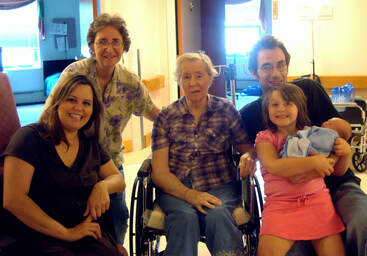

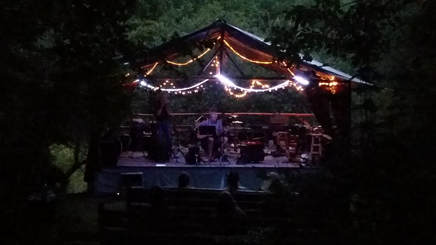
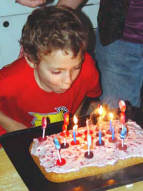


 RSS Feed
RSS Feed